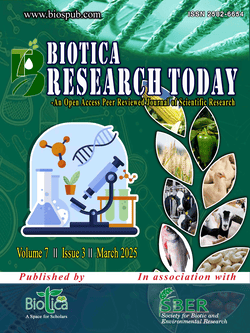
Plant Gene Editing Approaches in Crop Wild Relatives for De Novo Domestication
B.G. Sangeetha*
Division of Crop Protection, ICAR-Central Tuber Crops Research Institute, Sreekariyam, Thiruvananthapuram, Kerala (605 017), India
T. Makeshkumar
Division of Crop Protection, ICAR-Central Tuber Crops Research Institute, Sreekariyam, Thiruvananthapuram, Kerala (605 017), India
E.R. Harish
Division of Crop Protection, ICAR-Central Tuber Crops Research Institute, Sreekariyam, Thiruvananthapuram, Kerala (605 017), India
C. Pradeepika
Section of Crop Utilization, ICAR-Central Tuber Crops Research Institute, Sreekariyam, Thiruvananthapuram, Kerala (605 017), India
R. Arutselvan
Division of Crop Protection, ICAR-Central Tuber Crops Research Institute, Sreekariyam, Thiruvananthapuram, Kerala (605 017), India
DOI: NIL
Keywords: CRISPR-Cas9, Crop wild relatives, De novo, Wild
Abstract
The crop wild relatives (CWR) have been domesticated and were used for the conventional crop breeding programme as a source of genes tolerant to biotic and abiotic stress. With the advancement of modern biotechnological tools the genes of CWR were available in various public databases. This knowledge can be utilized for developing new cultivars from CWR by utilizing CRISPR/Cas9 technology. The CRISPR/Cas9 technology has been effectively applied in some of the CWR viz. Solanum pimpinellifolium, ground cherry (Physalis pruinosa), green millet Setaria viridis, Oryza glaberrima (Kabre), Solanum peruvianum, O. alta, Sea barleygrass (Hordeum marinum) for modifying various agronomically important traits. In this context here we discuss about the application of genome editing technologies in different CWRs and how it can be utilized for the de novo domestication of CWR.
Downloads
not found
Reference
Lacchini, E., Kiegle, E., Castellani, M., Adam, H., Jouannic, S., Gregis, V., Kater, M.M., 2020. CRISPR-mediated accelerated domestication of African rice landraces. PLoS One 15(3), e0229782. DOI: https://doi.org/10.1371/journal.pone.0229782.
Lemmon, H.Z., Reem, T.N., Dalrymple, J., Soyk, S., Swartwood, K.E., Leal, D.R., Eck, J.V., Lippman, Z.B., 2018. Rapid improvement of domestication traits in an orphan crop by genome editing. Nature Plants 4, 766-770. DOI: https://doi.org/10.1038/s41477-018-0259-x.
Li, T., Yang, X., Yu, Y., Si, X., Zhai, X., Zhang, H., Dong, W., Gao, C., Xu, C., 2018. Domestication of wild tomato is accelerated by genome editing. Nature Biotechnology 36, 1160-1163. DOI: https://doi.org/10.1038/nbt.4273.
Yu, H., Lin, T., Meng, X., Du, H., Zhang, J., Liu, G., Chen, M., Jing, Y., Kou, L., Li, X., Gao, Q., Liang, Y., Liu, X., Fan, Z., Liang, Y., Cheng, Z., Chen, M., Tian, Z., Wang, Y., Chu, C., Zuo, J., Wan, J., Qian, Q., Han, B., Zuccolo, A., Wing, A. R., Gao, C., Liang, C., Li, J., 2021. A route to de novo domestication of wild allotetraploid rice. Cell 184(5), 1156-1170. DOI: https://doi.org/10.1016/j.cell.2021.01.013.
Zsögön, A., Čermák, T., Naves, E.R., Notini, M.M., Edel, K.H., Weinl, S., Freschi, L., Voytas, D.F., Kudla, J., Peres, L.E.P., 2018. De novo domestication of wild tomato using genome editing. Nature Biotechnology 36, 1211-1216. DOI: https://doi.org/10.1038/nbt.4272.
